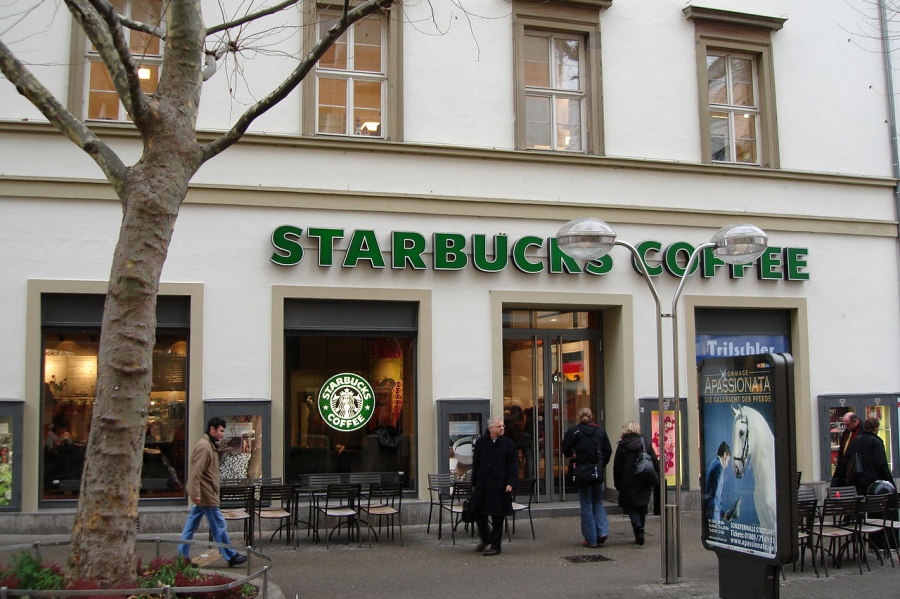Starbucks Is Brewing Up Massive Growth in China
To get a sense of the future of Starbucks, look to China.
The coffee giant is building a new store in the market every 15 hours and views accelerating growth there as one of its “three strategic priorities,” said Starbucks CEO and president Kevin Johnson at the Fortune Global Forum in Toronto on Tuesday.
More than 60% of Starbucks’ tender in China is paid for digitally via the company’s mobile app and partnerships with Alibaba (BABA, -1.07%) and Tencent. That compares to 40% in the U.S., which still makes Starbucks (SBUX, +2.25%) the largest mobile payment platform in the that market. Johnson called the mobile-digital relationship one of the “transformative elements of modern retail.”
Despite the surge in mobile and digital payments, Johnson said the company had no plans to create its own payment system because it wants to remain focused on its core business. “Getting into payments is not something that’s bubbled up to the priority list,” Johnson said.
In August, the company announced a new strategic partnership with Alibaba called “New Retail,” in which the company will take technology like artificial intelligence and integrate it into the brick and mortar experience.
Starbucks started in China 20 years ago with a joint-venture partner in the eastern part of the country and then began building out western China as a company-operated enterprise.
Last year, the company acquired 100% of the joint venture for more than $1 billion, unifying its operations of some 3,500 stores in mainland China as a company-operated market “built in China for China,” Johnson said.
The company is continuing to build the business in a way “we believe is respectful to Chinese culture” and resonates with the Chinese consumer as it introduces a “predominantly tea-drinking culture to premium espresso beverages,” Johnson explained.
Johnson said that so far the trade war hasn’t had a significant impact on business in China, but did acknowledge that “consumer confidence and the economic situation may have softened a little bit.” But with plans to build 600 new stores in China every year for the next five years, Johnson said “we are playing the long game.”
Tratto da fortune.com
To get a sense of the future of Starbucks, look to China.
The coffee giant is building a new store in the market every 15 hours and views accelerating growth there as one of its “three strategic priorities,” said Starbucks CEO and president Kevin Johnson at the Fortune Global Forum in Toronto on Tuesday.
More than 60% of Starbucks’ tender in China is paid for digitally via the company’s mobile app and partnerships with Alibaba (BABA, -1.07%) and Tencent. That compares to 40% in the U.S., which still makes Starbucks (SBUX, +2.25%) the largest mobile payment platform in the that market. Johnson called the mobile-digital relationship one of the “transformative elements of modern retail.”
Despite the surge in mobile and digital payments, Johnson said the company had no plans to create its own payment system because it wants to remain focused on its core business. “Getting into payments is not something that’s bubbled up to the priority list,” Johnson said.
In August, the company announced a new strategic partnership with Alibaba called “New Retail,” in which the company will take technology like artificial intelligence and integrate it into the brick and mortar experience.
Starbucks started in China 20 years ago with a joint-venture partner in the eastern part of the country and then began building out western China as a company-operated enterprise.
Last year, the company acquired 100% of the joint venture for more than $1 billion, unifying its operations of some 3,500 stores in mainland China as a company-operated market “built in China for China,” Johnson said.
The company is continuing to build the business in a way “we believe is respectful to Chinese culture” and resonates with the Chinese consumer as it introduces a “predominantly tea-drinking culture to premium espresso beverages,” Johnson explained.
Johnson said that so far the trade war hasn’t had a significant impact on business in China, but did acknowledge that “consumer confidence and the economic situation may have softened a little bit.” But with plans to build 600 new stores in China every year for the next five years, Johnson said “we are playing the long game.”
Tratto da fortune.com




